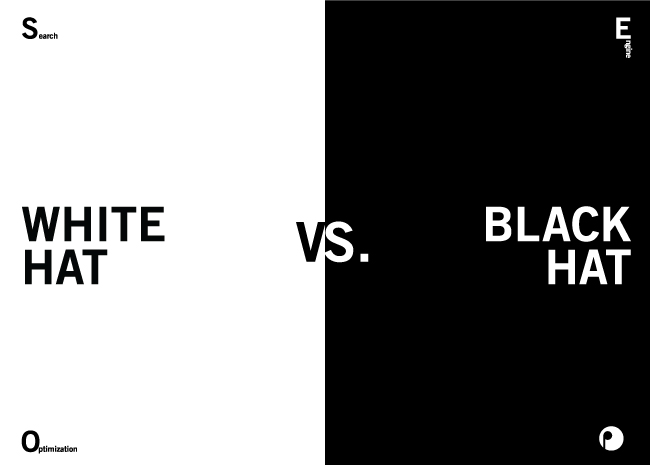White hat and black hat search engine optimization (SEO) techniques are, at their core, aiming at the same thing: good results for a website in the search engines. Both techniques aim to earn a site higher rankings when someone enters a search query or a number of different queries. Then, if a site has high visibility — i.e. it ranks on page one, or somewhere close — people are more likely to visit the site, therefore the site should see a higher ROI.

However, there’s a big difference between the two; black hat tactics are employed to game the system, while white hat practices work within the system to achieve the best, sustainable results. One is the kid who cheats their way through school; the other is the student who strives to improve their knowledge and quality of work in order to earn the best grades.
What is Black Hat SEO?
Black hat SEO is a set of illegal or unethical practices that an individual or group of individuals employ in the attempt to improve search engine results for a website or group of websites.
Black hat strategy maximizes short-term gains for a website by taking advantage of gaps, limitations, or blind spots in search engine algorithms. This often entails spammy practices that are bad for users.

These practices change over time as search engines become wise to black hat schemes. Here are some of the most common techniques found in the black hat deck of cards:
- Keyword Stuffing: Websites want to rank for certain keywords. Keyword stuffing involves creating web pages and content with an excessive volume of keywords in the attempt to send amplified keyword signals to search engines. This is supposed to make the website rank well for the keywords.
- Hiding Keywords: Similar to keyword stuffing, hiding keywords involves changing the color of a text’s font to make it invisible to human eyes. The invisible keywords are supposed to fool a search engine into giving the web page and the site to which it belongs a good ranking in search engines.
- Spamming Links in Comment Fields and Forum Posts: The internet is a network of hyperlinks. To try and manipulate search engines with links, black hat SEO practitioners have been known to insert links to web pages in comment fields of blog posts and on forums, believing these links will send positive signals to search engines.
- “Link Schemes”: Google details a variety of link schemes that are against its Webmaster Guidelines. These include the use of automated programs to build links to a website, offering someone a free product in exchange for a positive review and a link, and “excessive link exchanges,” in which websites exchange links to each other gratuitously.
- Misleading Redirects: If a web page is outdated or broken, a webmaster may redirect the user to a different page. A misleading redirect sends the user to a page where they see content different than what a search engine’s web crawler can read.
- Auto Content/Scraped Content: This is content created by a bot that is oftentimes gibberish, with the intent to fool search engines.
- Cloaking: Similar to misleading redirects, cloaking involves showing different content to the user than to the search engine bots.
There are many other black hat practices, all with the same purpose: to fool search engines into giving a webpage a better ranking than it deserves.
Why Do People Still Use Black Hat SEO Techniques?
People use black hat tactics under the assumption, correct or incorrect, that they can fool search engines.
Algorithms have blind spots. Black hat strategies are employed to take advantage of the blind spots to score a quick win and easy money. People who use black hat techniques don’t want to offer any value to internet users. These individuals may not consider the consequences, or they don’t care about the consequences, or they think they’re operating in such a way as to avoid the consequences.
Black Hat SEO and Google Algorithm Updates
Because Google controls over 90 percent of the search engine market share, black hat SEO tactics are primarily aimed at manipulating Google. Initially, this was a problem for Google until the search engine giant released the Penguin algorithm update in 2012.
Penguin reflected a new way of thinking on Google’s part. If you’re Google, you figure the best way to minimize or even obliterate black hat SEO is to make frequent updates to your entire algorithm that render black hat tactics ineffective.

Penguin took into account manipulative tactics and introduced an algorithm to punish websites that were engaging in them. If you were the webmaster or SEO specialist for a website that was using black hat tactics in April 2012, you experienced a sea change when Penguin knocked your web pages out of sight. Suddenly, traffic dropped and revenue tanked.
Avoid black hat SEO companies by spotting the red flags early with this free SEO Buyer's Guide!
Since then, Google has made many more updates; some huge, some not-so-huge. Google makes updates to try and improve user experience (UX), employing human Search Quality Evaluators who evaluate pages based on a set of guidelines.
These evaluations help inform and train Google’s algorithms. Because black hat SEO doesn’t optimize UX, each Google update goes against black hat SEO tactics. For example, the Panda algorithm, which saw 28 updates over the course of four years, downgrades web pages in the search engine results pages (SERPs) that have poor content quality and too many ads.
In the end, the goal is to reward web pages that offer users a quality experience.
How Black Hat SEO Hurts Websites
Websites that engage in black hat SEO may suffer several types of penalties:
- Algorithm deprioritization: Once Google’s algorithms crawl the website and register the signals other websites are sending to it, the website can experience a significant drop in rankings, meaning it’s essentially buried in Google’s list SERPs.
- Black listing: If a website’s black hat practices are particularly egregious, Google can take the step to completely remove it from the index.
In either case, Google doesn’t notify websites. Websites that get banned or deprioritized have to find out for themselves by searching for their own site in Google or via notifications in their Google Search Console.
If you're shopping for SEO services, there are some red flags you can look for to identify potential black hat SEO companies. These red flags include:
- There is no transparency and/or they won’t clearly explain what they intend to do for you.
- They promise thousands of links over a short period of time.
- They claim to have a relationship with Google.
- Or they guarantee #1 rankings.
Stay away from any agencies that exhibit this type of behavior.
What is White Hat SEO?
White hat SEO is a set of by-the-book, ethical, technical, and aesthetic practices that an individual or group of individuals employ in the attempt to improve search engine results for a website or group of websites. White hat SEO describes the bulk of SEO best practices by reputable companies.

White hat practices concentrate on improving the quality of a website. They also concentrate on sending the right signals to Google so the search engine can recognize a site’s purpose and authority.
White hat SEO specialists take into mind Google’s quality guidelines, guidelines from other search engines, and the cornerstones of good user experience. In so doing, they optimize a website for both human purposes and search engine algorithm purposes.
White Hat SEO Techniques
White hat SEO starts with an analysis of a website and its competitors. The intent is to find gaps and issues with the signals your site is sending to search engines. The goal is to fix these issues so that search engines and users find your site useful for their purposes.
For example, an analysis may find your competitor has more informative blog posts focused around a keyword or a set of keywords for which you’re trying to rank. This content is important because it’s highly relevant to your niche. The practice of writing authoritative articles in your niche is called content marketing.
Google’s focus on usefulness of content means that a well-thought-out content marketing strategy is one of the biggest SEO favors you can do yourself. In that situation where content marketing is deficient, the white hat SEO specialist will help you create more content to satisfy queries users may have in relation to your keywords.
Here are a few primary white hat techniques:
- Content Optimization: You can optimize any piece of content on your site to suit its purpose. First and foremost, the content must be linkable content that helps draw interest from users because it’s informative and even entertaining. Content optimization is about creating new content and revising old content to attract a target audience. Search engines register the increase in relevant, authoritative, and quality content, rewarding your site accordingly.
- Technical SEO: Your site’s meta-structure, internal links, tags, and keyword usage are just a few of the aspects that determine its technical merit. Website SEO audit services evaluates any technical issues and chances for improvement. Sites that enhance their technical merit often experience a near-immediate boost in the SERPs.
- Link Building: Link building is about sharing your useful content with other websites. Google and other search engines look positively at relevant links that help direct users to what they’re looking for from resource pages and blog posts. Rather than engaging in advertorial, keyword-optimized linking practices, which Google discourages, white hat link building focuses on sharing information in order to tell users and search engines where you belong in the broader context of the internet. When search engines see these links sending signals from authoritative external websites, it can result in a bump in rankings.
White hat SEO concentrates on organic, evergreen strategies that increase your rankings over time. This isn’t a quick win, but it’s a big win; white hat SEO is a way of cooperating with search engines and users who want to experience the value of your website, product, or service.
Why White Hat SEO Is Worth the Time
White hat SEO is worth the time and money for multiple reasons.
First, you can feel good about what you’re offering to the user. It’s as if you’re presenting a store where everything is clearly marked and organized. The aisles and shelves are clean, it’s well-stocked, and salespeople are friendly and informative without being pushy.

Second, white hat SEO sets you up for success and a solid ROI in the long term. A white hat strategy doesn’t try to manipulate Google’s search algorithm — instead, it bulletproofs and boosts your website for future algorithm changes. If your site is sending the right signals, the inevitable algorithm changes will result in a better ranking.
Third, your business grows as your site grows. White hat SEO is about focusing on your value proposition. As you concentrate on offering maximum value through your website, every aspect of your business can’t help but follow suit.


